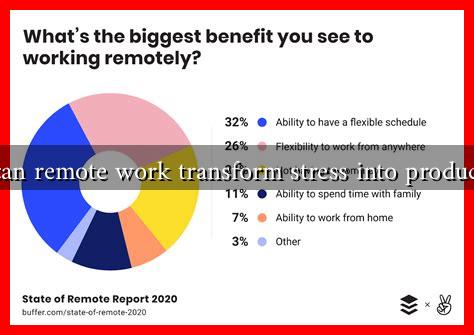-
Table of Contents
How Can Remote Work Transform Stress into Productivity?
In recent years, remote work has transitioned from a niche arrangement to a mainstream practice, especially accelerated by the COVID-19 pandemic. While many initially viewed remote work as a source of stress due to isolation and blurred work-life boundaries, it has the potential to transform stress into productivity. This article explores how remote work can enhance productivity by reducing stressors and fostering a healthier work environment.
The Stressors of Traditional Work Environments
Before delving into the benefits of remote work, it’s essential to understand the common stressors associated with traditional office settings:
- Commute: Long travel times can lead to fatigue and decreased motivation.
- Office Distractions: Noise, interruptions, and social dynamics can hinder focus.
- Rigid Schedules: Fixed hours can create pressure and limit flexibility.
- Workplace Politics: Navigating relationships can be a source of anxiety.
These stressors can lead to burnout, decreased job satisfaction, and ultimately lower productivity. However, remote work offers solutions to these challenges.
How Remote Work Reduces Stress
Remote work can alleviate many of the stressors found in traditional work environments. Here are some ways it does so:
- Elimination of Commute: Working from home eliminates the daily commute, saving time and reducing stress. According to a study by the U.S. Census Bureau, the average American spends about 26 minutes commuting each way. This time can be redirected towards productive work or personal well-being.
- Flexible Schedules: Remote work allows employees to create their own schedules, accommodating personal responsibilities and peak productivity times. A survey by FlexJobs found that 73% of respondents cited flexible schedules as a significant benefit of remote work.
- Personalized Work Environment: Employees can design their workspace to suit their preferences, whether that means a quiet room or a lively café. This personalization can enhance comfort and focus.
- Reduced Office Politics: Remote work minimizes face-to-face interactions, which can reduce the stress associated with workplace politics and interpersonal conflicts.
Transforming Stress into Productivity
By reducing stressors, remote work can lead to increased productivity in several ways:
- Enhanced Focus: With fewer distractions, employees can concentrate better on their tasks. A study by Stanford University found that remote workers were 13% more productive than their in-office counterparts.
- Improved Work-Life Balance: Remote work allows for a better balance between personal and professional life, leading to higher job satisfaction and motivation. Employees who feel balanced are more likely to be engaged and productive.
- Healthier Lifestyle Choices: Remote work can encourage healthier habits, such as cooking at home, exercising during breaks, and taking mental health days when needed. A healthier employee is often a more productive one.
- Increased Autonomy: Remote work fosters a sense of ownership over one’s work. This autonomy can lead to higher motivation and creativity, as employees feel trusted to manage their tasks.
Case Studies and Statistics
Several companies have successfully implemented remote work policies and witnessed significant improvements in productivity:
- GitLab: This all-remote company reported that their employees are 20% more productive than those in traditional office settings.
- Buffer: Buffer’s remote work culture has led to a 100% employee satisfaction rate, with many employees citing flexibility as a key factor in their productivity.
- Microsoft Japan: A trial of a four-day workweek resulted in a 40% increase in productivity, demonstrating the potential of flexible work arrangements.
Conclusion
Remote work has the potential to transform stress into productivity by addressing the common stressors associated with traditional office environments. By eliminating commutes, offering flexible schedules, and fostering a healthier work-life balance, remote work can enhance focus and motivation. As companies continue to adapt to this new normal, understanding the benefits of remote work can lead to a more productive and satisfied workforce. Embracing remote work not only benefits employees but can also drive organizational success in an increasingly competitive landscape.
For more insights on remote work and productivity, you can visit FlexJobs.

